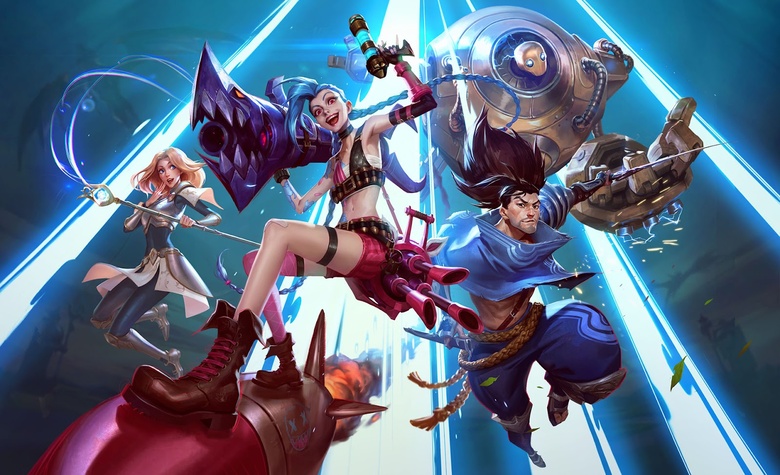League of Legends: A Look at Its Unmatched Popularity

Since its release in 2009, League of Legends (LoL) has become one of the most popular video games in the world, engaging millions of players and revolutionizing the gaming industry. Its success lies in its innovative gameplay, thriving esports scene, and cultural influence that extends beyond gaming. However, a less discussed aspect of LoL's popularity is its clever use of mechanics that mirror the appeal of slot machines, particularly through features like loot boxes and random rewards. This creates a psychological incentive that hooks players and incorporates elements of gambling into the gaming experience. In this article, we explore what makes League of Legends so popular and how it has maintained its dominance over the years.
The History of League of Legends: From Start to Worldwide Fame
League of Legends was developed by Riot Games and released in October 2009. The game began as a free-to-play title with the goal of providing an accessible and fun multiplayer experience. The game's popularity grew quickly thanks to its innovative design, regular updates, and a strong community.
What set LoL apart from other games at the time was its accessibility. Players could download and play the game for free, with the option to purchase in-game items such as skins or champions. This model attracted a large player base, and as the game grew in popularity, Riot Games regularly released updates, new champions, and features to keep the game fresh and exciting.
Over the years, LoL became a global phenomenon with millions of active players around the world. The game's competitive scene also grew, with professional leagues, regional tournaments, and the prestigious League of Legends World Championship attracting millions of viewers. Today, LoL is an integral part of the world of gaming and esports, with a loyal fan base and a large number of players.
The core gameplay mechanics that keep players engaged
The gameplay of League of Legends is a key reason why the game is so addictive. The game is a multiplayer online battle arena (MOBA) where players control a champion and work with their team to defeat the opposing team. The match takes place on a map divided into three lanes, with each team aiming to destroy the opposing base while defending their own.
The depth of the game comes from the variety of champions available. Each champion has their own unique abilities, allowing players to learn different playstyles and strategies. Communication and teamwork are essential, as players must work together to complete objectives, defeat enemies, and gain control of the map.
As players play, they gain experience and gold, which they can use to purchase items and upgrade their champions. The progression system adds a strategic layer, as players must decide how to spend their gold and choose the best items to match their champion's strengths and weaknesses. This combination of strategic decision-making, skill-based gameplay, and teamwork keeps players coming back for more.
The Thrill of Unlocking Champions: A Slot Machine Effect in Gaming
One of the things that keeps players hooked in League of Legends is the thrill of unlocking new champions or skins. While players can purchase champions outright, they often earn them through loot boxes or event-based rewards. This randomness is reminiscent of slot machines, as players eagerly await what reward they will receive next.
The excitement of unlocking new content triggers a dopamine response that makes players feel rewarded and encourages them to keep playing. While this feature is a fun aspect of the game, it also highlights the need for responsible gaming practices. Much like gambling, it's important that players set limits for themselves and avoid investing too much time or money in the pursuit of rewards. Responsible gaming campaigns are designed to help players enjoy the game in a healthy way and promote balance and moderation.
The cultural impact of League of Legends around the world
League of Legends has had a huge cultural impact, affecting not only the gaming community but also mainstream media. The game's characters, storylines, and music have inspired countless fan creations, from art to cosplay. The success of LoL's esports scene has also played a significant role in the growth of competitive gaming.
The annual League of Legends World Championship draws millions of viewers worldwide, rivaling the viewership of traditional sporting events. The game has become a central part of the esports ecosystem, where professional teams and players compete at the highest level.
Beyond gaming, LoL has also made inroads into other media. Riot Games released Arcane , an animated series based on the game's world and characters that was widely praised for its storytelling and animation. This series helped further establish League of Legends not just as a game, but as a global entertainment brand.
Conclusion
League of Legends has undoubtedly established itself as a cultural and gaming phenomenon thanks to its addictive gameplay, frequent updates, and electrifying esports scene. Its ability to captivate players is enhanced by mechanics like the random loot rewards that mimic the appeal of slot machines. While these features increase player retention, they also serve as a reminder of the fine line between gaming and gambling, emphasizing the importance of balance and responsible gaming. As LoL evolves, it will remain a central part of the gaming world, offering new experiences and encouraging players to enjoy its features in moderation.